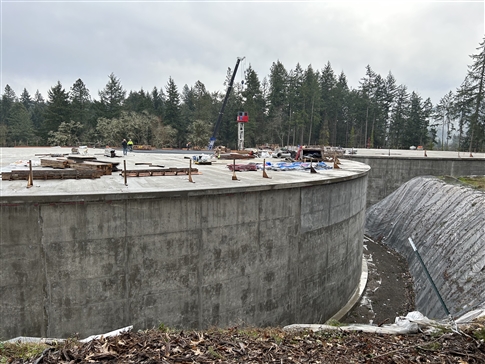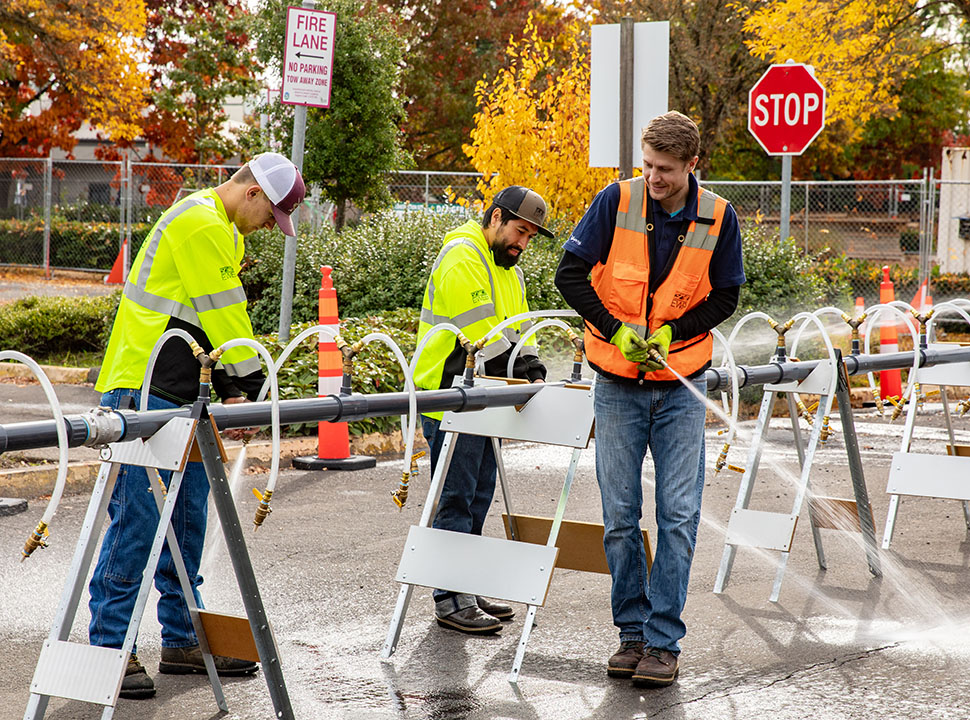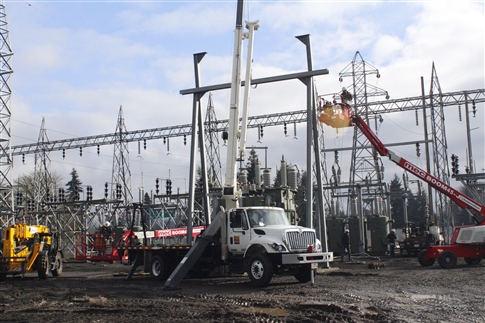Join our project email list
Click here to start receiving news and updates on EWEB's College Hill Reservoir improvement project.
After serving Eugene for over 80 years, the College Hill Reservoir reached the end of its useful life and failed to meet current seismic standards. EWEB is working to replace the College Hill Reservoir with new, modern drinking water storage tanks built to withstand major earthquakes.
Project Status
The tanks are taking shape as regular concrete pours continue. Pipeline work within the tunnel will restart in January. The intersection of Lincoln Street and 23rd Avenue is expected to reopen in March.
See the project updates section of this webpage for additional information and contact the project team at water.storage@eweb.org or 541-685-7899 if you have any questions or concerns.
Learn More: Project Timeline | Coffee with Laura | Public Involvement | New Tank Design | Tunnel and Pipelines | News & Updates | Ask a Question | Frequently Asked Questions
Project Timeline
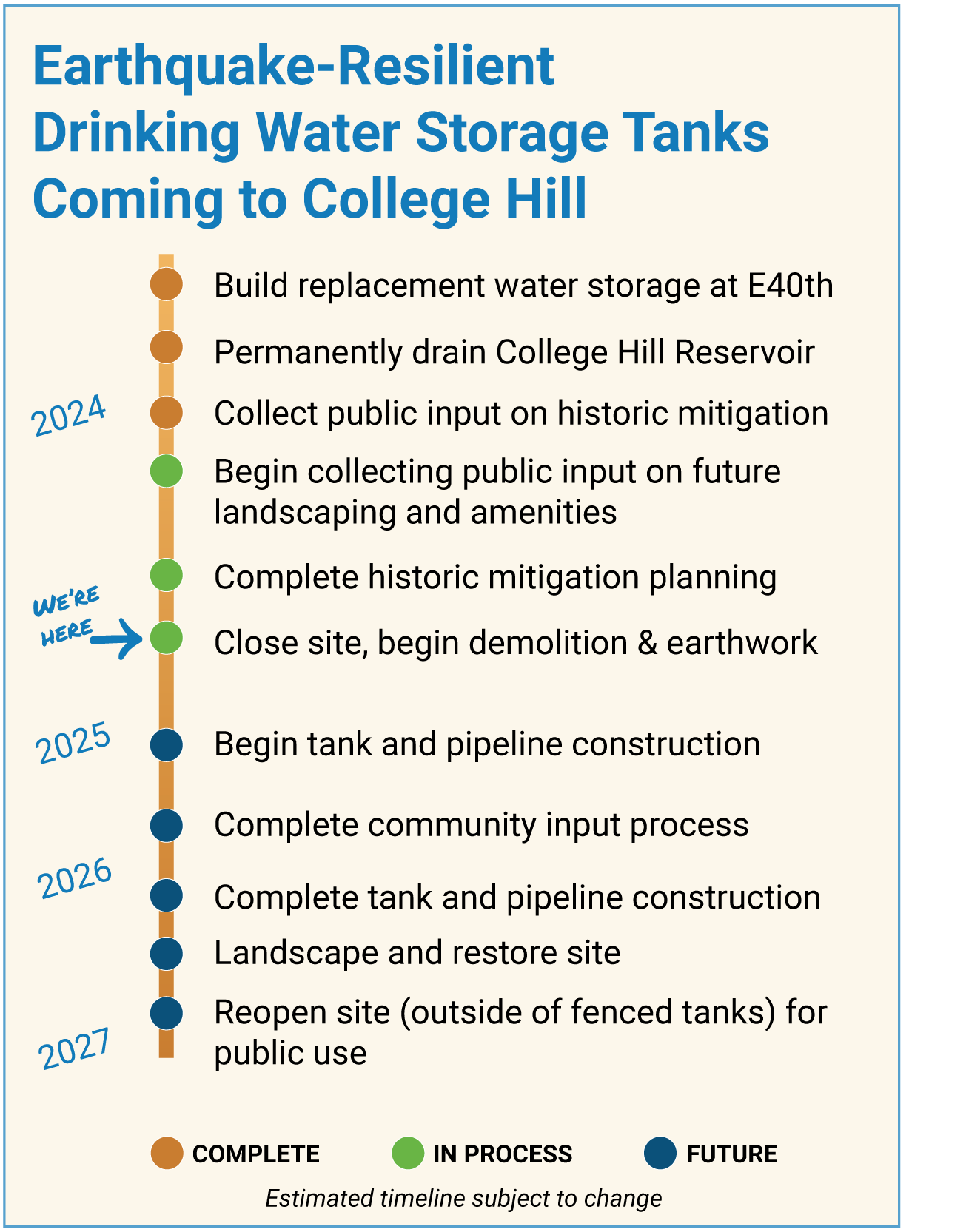
The process of removing the existing structures and preparing the site for construction started in July of 2024 and concluded in April of 2025.
Construction of the new tanks, piping, and backfilling started in June of 2025 and will last approximately 12-18 months.
Transmission main and storm drain construction from 23rd and Lincoln to the connection point near 23rd Ave. and Amazon Drive is likely to start mid-2026 and will take approximately one year.
Site restoration & landscaping is anticipated to begin in late 2026 or early 2027. We will continue collecting community input on landscaping and public amenities into 2026.
Coffee with Laura
Project Manager, Laura Farthing, P.E., will be onsite periodically to answer questions about the College Hill Reservoir Replacement Project. See below for confirmed meeting dates and times. Sessions are bring your own coffee (BYOC) unless otherwise noted to celebrate a major project milestone. If you would like to suggest an agenda item, please email water.storage@eweb.org.
- The team is taking a break from coffee gatherings over the cold winter months and will resume in the spring. If you have a question in the meantime, please send us an email.
Public Involvement
EWEB recognizes that College Hill is a valued gathering place for the community. We are seeking the public’s help in memorializing the history of the reservoir and planning for future recreation on site. Click below to learn more about each input opportunity.
|
Historic Mitigation |
|
Landscaping & Amenities |
-
The Historic Mitigation and Landscaping & Amenities plans will come together to inform the public spaces on site.

New Tank Design
Learn more about the design of the new earthquake-resistant water storage tanks at College Hill.
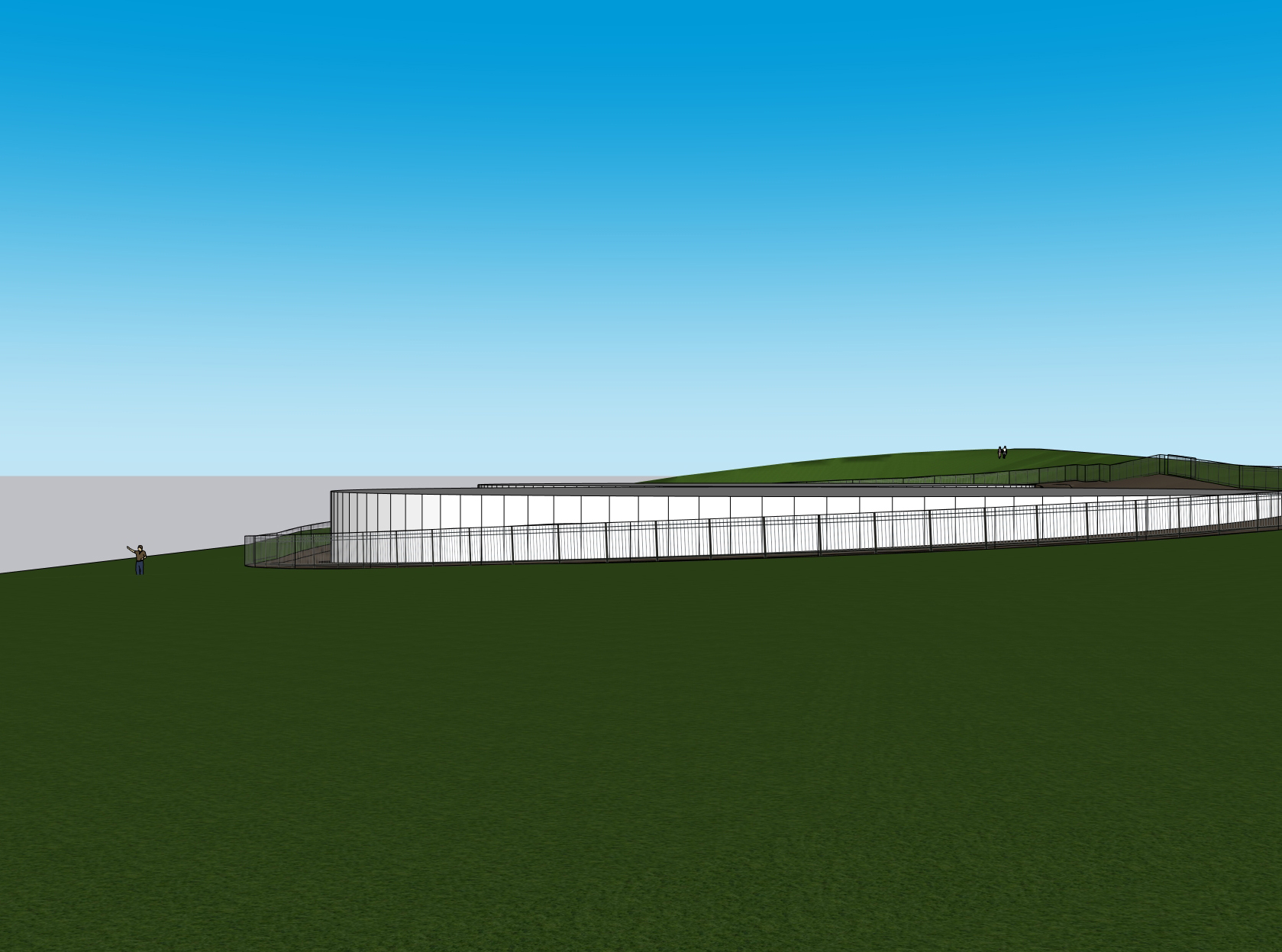
Tunnel and Pipelines
Just like the reservoir, the pipelines that connect it to the system are aged and in need of replacement. EWEB is installing new, durable pipeline as a part of this project.
Read more...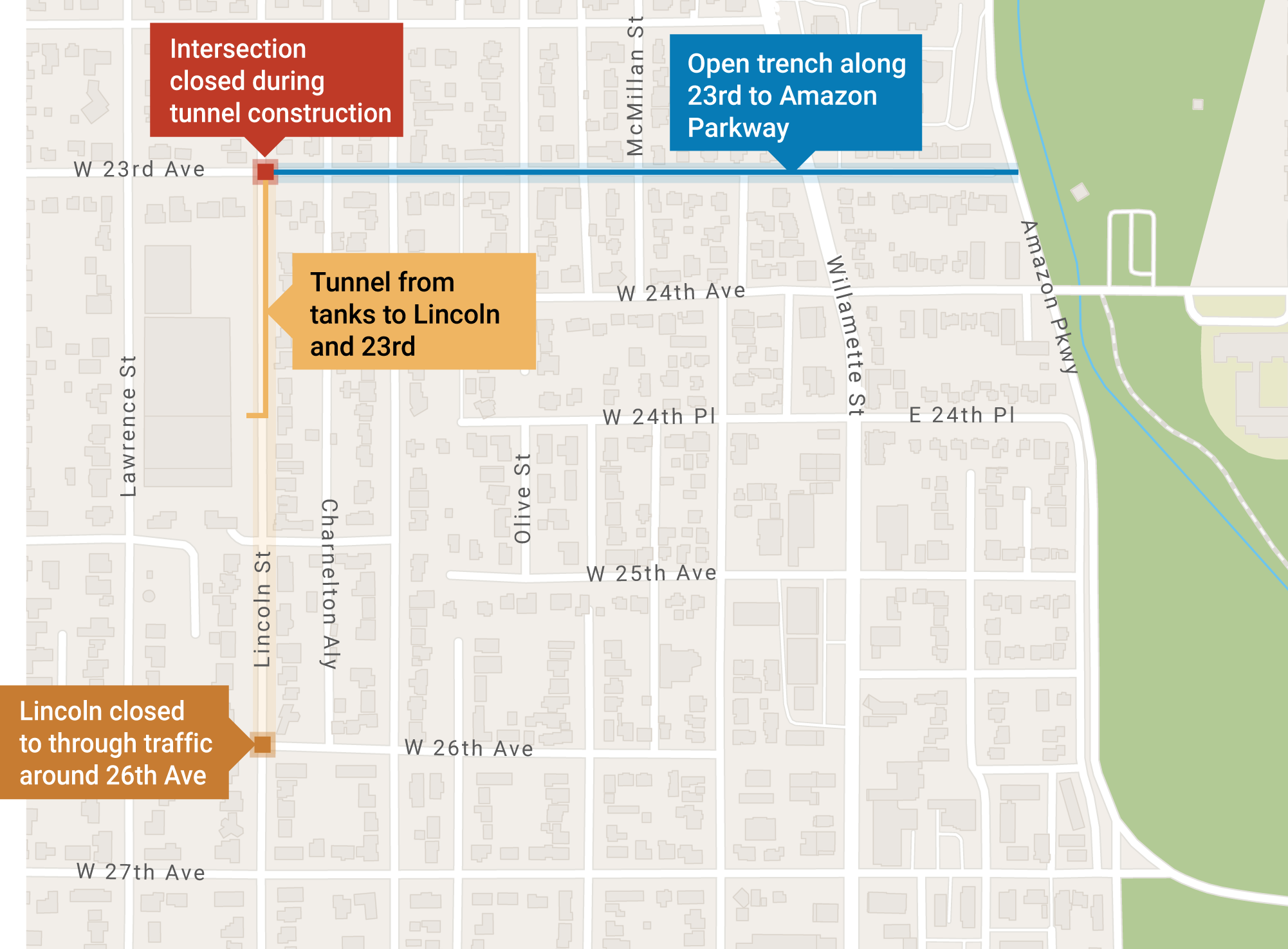
News and Updates
We are committed to keeping our customer-owners informed about this project. In addition to information posted on this website, we will share regular updates through email, social media (follow us @EWEButility), traditional news media, and other channels.
Email Updates
December 22, 2025: 2025 Year in Review
November 21, 2025: An update on intersection closure and tank construction
October 1, 2025: Tunnel boring is complete; machine will be extracted tomorrow morning
September 24, 2025: Wall construction process and tunnel update
August 18, 2025: Tunneling machine could lauch this week
July 28, 2025: Concrete pour to start July 31:What to expect during upcoming pours
July 15, 2025: Construction update, invite to Coffee with Laura, and a deep dive on tunneling
July 8, 2025: Construction of inlet/outlet pipes, tank bases and excavation for tunnel
Board Meetings
April 2, 2024: College Hill 607 Reservoir Replacement Update memo and recorded presentation.
Sept. 5, 2023: College Hill Construction and Public Outreach Plans memo and recorded presentation.
News Stories
Lookout Eugene-Springfield, July 16, 2025: Second phase of College Hill reservoir project begins
Lookout Eugene-Springfield, June 25, 2025: Ask Lookout: What delayed the College Hill Reservoir project?
The Register-Guard, May 2, 2025: What's that construction happening at EWEB's College Hill Reservoir?
KMTR, January 2, 2025: EWEB nears completion of explosive reservoir demolition at College Hill
KLCC, September 20, 2024: Eugene’s College Hill Reservoir replacement project is ahead of schedule
KLCC, August 13, 2024: Short film celebrates College Hill Reservoir as a 'public space' in Eugene
The Register-Guard, August 9, 2024: What's that construction at EWEB's College Hill Reservoir?
KLCC, July 4, 2024: EWEB will close public access to College Hill Reservoir Monday
The Register-Guard, June 2, 2024: Eugene says goodbye to 80-year-old College Hill Reservoir. Here's what happens next
Ask a question and offer input
We are tracking questions and input from the public. If you are curious about a specific aspect of the project or want to submit a comment, email the EWEB project team at water.storage@eweb.org.
Frequently asked questions
Why is this project necessary?
EWEB's College Hill Reservoir—which served all Eugene homes and businesses, and provided emergency water for critical community needs, including fire suppression—reached the end of its useful life and failed to meet current seismic standards. It was unlikely to survive a major earthquake, resulting in Eugene losing critical supplies of safe drinking water in the event of a disaster.
In addition, the Oregon Health Authority (OHA) required EWEB to rehabilitate or decommission the reservoir because of leaking roof joints. The reservoir also did not drain and fill effectively, which impacted water quality.
Decommissioning the existing facility and building new water storage tanks at College Hill is the most cost-effective solution long-term and will improve water quality and resiliency for all Eugene residents.
What would have happened to the College Hill Reservoir in an earthquake and will the new water tanks be built to withstand a Cascadia-level event?
The original reservoir was built without any consideration of seismic events, so it would have likely failed to hold water under any significant earthquake event. The new tanks will be built to the highest level of resiliency to withstand and provide drinking water after a major earthquake.
Why couldn’t EWEB repair the reservoir?
The 80-year-old structure would have required significant retrofitting and expensive maintenance to protect the drinking water inside. Even after those investments, the reservoir would have remained vulnerable to earthquake damage.
Is there any way to drain the reservoir and leave it in place?
No. Our community needs the stored water at College Hill to meet demand and ensure there is sufficient pressure in the system for firefighting and other public uses. To ensure everyone in Eugene has safe, reliable water, the existing reservoir must be replaced with new storage.
Can we build replacement storage somewhere else?
No. College Hill is part of a network of tanks that must be at exactly 607 feet in elevation for Eugene’s gravity-fed water system to function. Vacant property at the right elevation is nearly impossible to acquire and it would not be practical or a responsible use of customer dollars to abandon College Hill.
Where will the new tanks be located and what will they look like?
The new round tanks will be located within the footprint of reservoir 607. About the same amount of the new tanks will be visible above ground as the original reservoir.
Will the public be able to use the surface of the new tank(s)?
No. Contemporary public health standards require that drinking water facilities need to be secure to protect water quality. The new tanks will have decorative fencing/landscaping around the perimeter.
Will the public be able to use other areas of the site?
Yes. We plan to maintain open public space at College Hill.
Can I provide ideas and suggestions for public uses of the site?
Yes. However, decisions that affect water quality, safety, and engineering (such as tank size, siting, elevation, and security measures) must be made by qualified staff to comply with regulations.
The valuable opportunities for public input involve site aesthetics and amenities. For property retained by EWEB and not used for storing and protecting drinking water, site neighbors and other residents will be invited to participate in decisions that involve:
- Landscape design such as trees, shrubs, berms and other vegetation features
- Public amenities (outside the fenced tanks) such as paths, ground surfaces, and spaces for recreational activities
- Honoring College Hill's history such as documenting the site, interpretive displays, and educational events
Opportunities for public input will be widely advertised on EWEB’s website, through neighborhood association newsletters, email communications, and other channels. Currently, you can use the “Submit a Comment” link on the Landscaping and Amenities webpage or email your input to water.storage@eweb.org. Input is tracked and published on the website in batches for public viewing. Later in 2024 and continuing into 2025, we will engage in a more formal public engagement process.
Will blasting be used during demolition and earthwork?
Yes. Controlled drilling and blasting was necessary to loosen and fragment rock materials to a size that could be removed, transported, or crushed from the College Hill site. EWEB worked with a qualified subcontractor, Aggregate Resource Industries (ARI), for the controlled drilling and blasting on this project. ARI reviewed the geology of the site and determined controlled drilling and blasting could be accomplished within thresholds for ground vibration and air overpressure adopted by the Oregon State Fire Marshal in the National Fire Protection Association (NFPA) 495 standards. These standards were adopted to ensure the protection of properties near blast sites. Learn more.
What route is used by construction vehicles?
Trucks use 29th Avenue to Lincoln Street to enter and exit the site.
What are the hours of work?
Work will typically begin at 7 a.m. and conclude by 5 p.m., Monday through Friday. We will only do work during hours that the City of Eugene noise ordinance allows and we will communicate work hours as the work progresses.
Will the future site include a flat, hard surface for roller sports and similar activities?
Decisions about future site design and public uses will be made after a public engagement process and will be based on several factors including:
- Safety - Public spaces must be safe, accessible, and welcoming to all users. Features that could become an attractive nuisance will be avoided to encourage safe and positive use of the space.
- Water Quality - The design of public spaces must support the efficient operation of water infrastructure by providing unimpeded access to the tanks by EWEB personnel and restricting public access to the tanks to protect water quality.
- Cost - All EWEB customers share in the expense of these improvements. Our goal will be to maximize the benefit of public spaces while minimizing costs. This includes both up-front and long-term costs such as ongoing maintenance and repair.
- Environmental Considerations - The design and construction of public space will consider environmental impacts in urban settings. This includes considering the use of sustainable materials, reducing the carbon footprint of construction activities, managing stormwater runoff to prevent pollution, and promoting green infrastructure such as permeable surfaces and native landscaping to enhance urban biodiversity and reduce heat island effects.
- Community Considerations - We will strive to identify and gather perspectives from a diverse group of customers, including those who live and recreate at the reservoir as well as customers who live outside the College Hill neighborhood but are impacted by the project through water rates, quality, safety, and reliability.
Related Programs
In March 2024, EWEB completed construction of two new 7.5 million gallon earthquake-proof tanks on an undeveloped 10-acre site.
We are working with community partners to develop an emergency water supply program that includes several permanent distribution sites located throughout the community using groundwater wells, as well as mobile water trailers.

